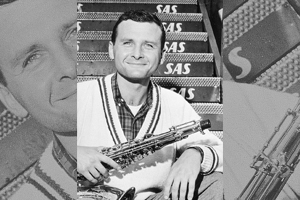Henry “Red” Allen Day
January 7, 1906 – April 17, 1967
A tribute to the brilliant New Orleans trumpeter
Click here to Support Jazz on the Tube
Trumpeter and singer Henry “Red” Allen was born on January 7, 1908 in Algiers, Louisiana.
The son of bandleader Henry Allen Sr., Red picked up early experience playing drums, ukulele, violin and alto horn before switching to trumpet.
He was part of the New Orleans jazz scene in the 1920s, moved up North briefly in 1927 to join King Oliver and record with Clarence Williams, and permanently in 1929.
As a member of the Luis Russell Orchestra and the leader of his own record dates starting in 1929, Allen made a strong impression in the jazz world, recording many classic performances.
Allen was one of Russell’s main stars until 1932, was impressive during his year with the Fletcher Henderson Orchestra (1932-33), and was a key soloist with Mills Blue Rhythm Band (1934-37).
Somewhat buried during 1937-40 when he was a member of the Louis Armstrong Big Band, he went out on his own in 1940 and was part of the New Orleans revival (recording with Jelly Roll Morton and Sidney Bechet) while leading a very spirited sextet that fell between New Orleans jazz, hot swing and early r&b.
Allen developed as a sideman in the 1940s, played modern speechlike solos that had unpredictable phrasing (also singing in the same manner) and building up exciting improvisations that usually stole the show.
A major attraction for decades (and based for 11 years at New York’s Metropole), Allen could always be counted on for exciting performances, leading small groups up until the time of his death.
Here is a particularly classic and memorable performance. Taken from the late-1957 televised broadcast of The Sound Of Jazz, this version of “Wild Man Blues” not only features Henry “Red” Allen but solos from trombonists Vic Dickenson, tenor-saxophonist Coleman Hawkins, clarinetist Pee Wee Russell, and cornetist Rex Stewart with backing from pianist Nat Pierce, guitarist Danny Barker, bassist Milt Hinton and drummer Jo Jones; notice how the players constantly react to each other (Stewart’s solo makes some fun of Russell’s and Allen, inspired by Stewart’s high-note outburst, hits a high note of his own).
-Scott Yanow


 Stan Getz
Stan Getz